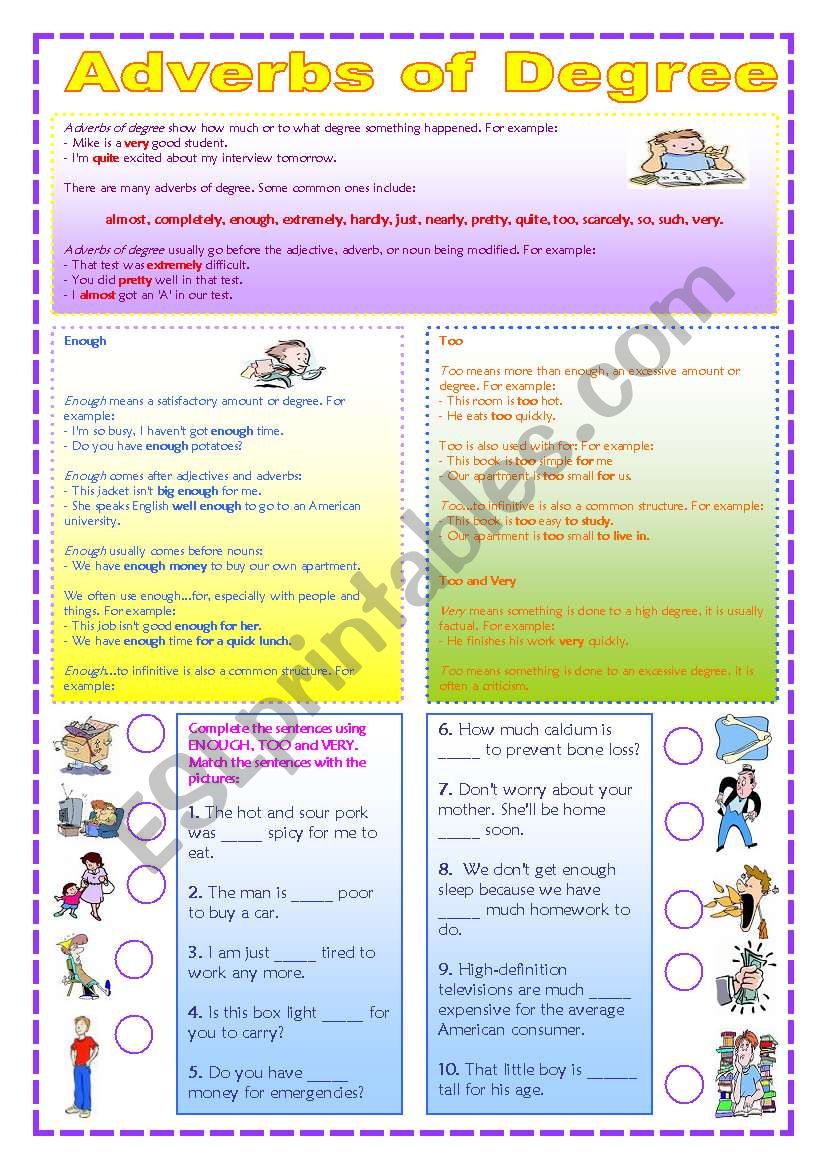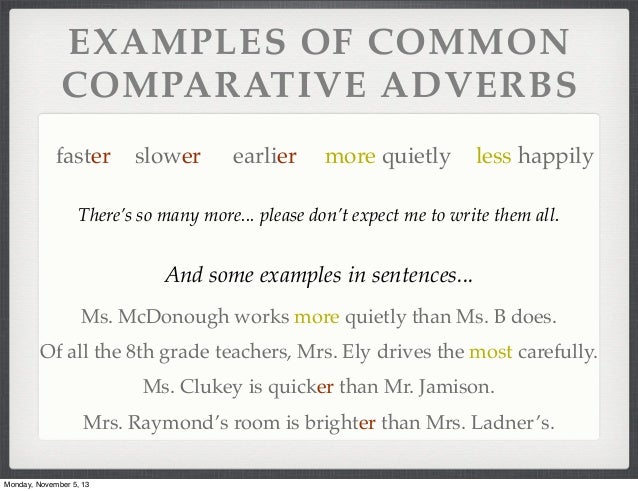Adverb Of Degree Examples Sentences / View 42+ View Example Sentence For Adverb Of Time ... : They can be used before adjectives, verbs, or other adverbs.
- Dapatkan link
- X
- Aplikasi Lainnya
Adverb Of Degree Examples Sentences / View 42+ View Example Sentence For Adverb Of Time ... : They can be used before adjectives, verbs, or other adverbs.. Is your coffee hot enough? Complete the sentences with the correct answer from a, b, c or d: In the following examples, we'll detail the uses of adverbs modifying verbs, other adverbs and adjectives. However, manner adverbs, frequency adverbs, time adverbs, degree adverbs and place adverbs are the most commonly used. Time adverbs describe how long and when an action occurred.
Select the response from the list that best completes the sentence. Adverbs modify other words, such as verbs and adjectives, and can even modify other adverbs. Very, too, totally, completely, so, etc. Common adverbs of degree include: Click on a topic to learn more about.

Almost absolutely awfully* badly* barely completely decidedly deeply enough enormously entirely extremely fairly far fully greatly hardly highly how incredibly indeed intensely just.
Adverbs of degree can modify verbs, adjectives and other adverbs, and tell us the extent to which something happens. Click on a topic to learn more about. They can be used before adjectives, verbs, or other adverbs. Adverbs are words that function as modifiers of sentences, clauses or various elements of clauses. Adverbs of degree are used to modify verbs, adverbs and adjectives. Time adverbs describe how long and when an action occurred. Express intensity with degree adverbs (modifying verbs, adverbs and adjectives); The adverbs of degree give information about the intensity or degree of an action, adjective or another adverb. Common adverbs of degree include: On this page, you can find many adverb examples and adverb example sentences. They are a special type of adverb, so i don't really like to think of them as. These adverbs answer the question: Is your coffee hot enough?
Enough as an adverb meaning 'to the necessary degree' goes after adjectives and adverbs. Adverbs of degree can modify verbs, adjectives and other adverbs, and tell us the extent to which something happens. Select the response from the list that best completes the sentence. Adverbs of degree tell us about intensity or degree of an adjective, adverb or action. Degree adverbs are used to show the intensity or degree of something.

I know i'm a very good football player.
They can be used before adjectives, verbs, or other adverbs. Select the response from the list that best completes the sentence. Adverbs of degree tell how much or to what extent. these adverbs are sometimes called intensifiers because they add intensity (either positive or notice how the adverbs of degree in the sentences below add intensity to the words they modify: However, manner adverbs, frequency adverbs, time adverbs, degree adverbs and place adverbs are the most commonly used. I am not quite ready to go. They tell us the degree or extent to which something happens. Very, slightly, quite, totally, fairly, absolutely and extremely. Adverbs of degree can modify verbs, adjectives and other adverbs, and tell us the extent to which something happens. An adverb is a word which is used to modify any part of speech except a noun or pronoun. Adverbs of degree are used to answer how far? or how much? questions while qualifying or modifying verbs or adjectives in the sentence. This box isn't big enough. They can provide a wide range of information. Almost absolutely awfully* badly* barely completely decidedly deeply enough enormously entirely extremely fairly far fully greatly hardly highly how incredibly indeed intensely just.
They are a special type of adverb, so i don't really like to think of them as. Adverbs modify other words, such as verbs and adjectives, and can even modify other adverbs. Enough as an adverb meaning 'to the necessary degree' goes after adjectives and adverbs. It modifies the meaning of a verb, adjective, adverb or a sentence. My income is barely enough to maintain living.

Adverbs of degree are used to modify verbs, adverbs and adjectives.
Adverbs of degree are used to modify verbs, adverbs and adjectives. Adverbs of degree modifying adjectives. Complete the sentence with a degree adverb. Degree adverbs are used to show the intensity or degree of something. They tell us the degree or extent to which something happens. Click on a topic to learn more about. Time adverbs describe how long and when an action occurred. Almost absolutely awfully* badly* barely completely decidedly deeply enough enormously entirely extremely fairly far fully greatly hardly highly how incredibly indeed intensely just. As you will soon see, they are usually placed before the word they are modifying. Adverbs of time are usually placed at the beginning or end of a sentence. Adverbs are words that function as modifiers of sentences, clauses or various elements of clauses. The adverbs of degree give information about the intensity or degree of an action, adjective or another adverb. They are a special type of adverb, so i don't really like to think of them as.
- Dapatkan link
- X
- Aplikasi Lainnya
Komentar
Posting Komentar